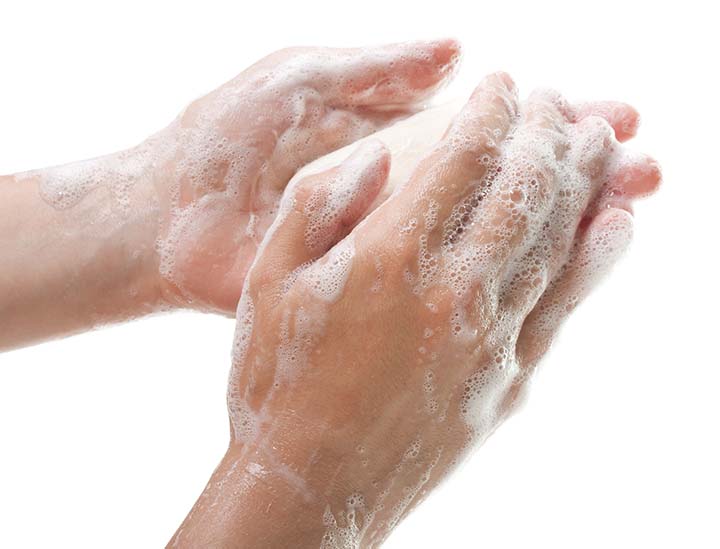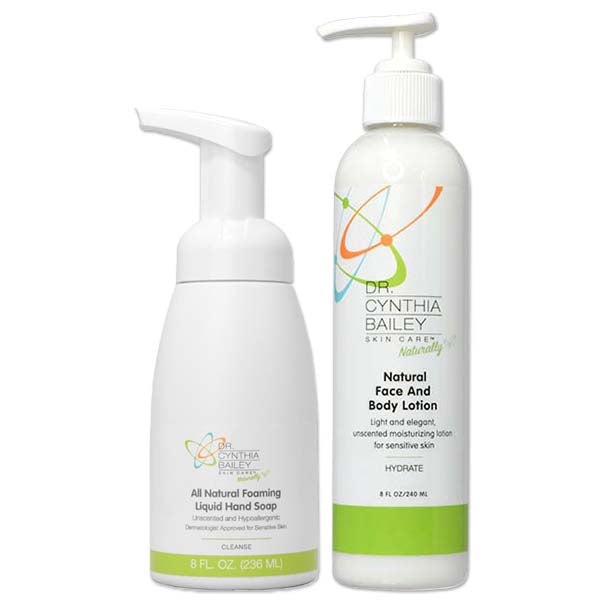Is Bar or Liquid Soap Best for Hand Washing to Prevent Covid?

Is bar or liquid soap best for hand washing to prevent COVID? Is one type of soap more hygienic than the other? Is one more effective at removing the COVID virus? More than ever, you want to get your hand washing right.
The answer is that both types of soap have their fans but experts say all soaps work when it comes to germ control. The most important point is to wash your hands well with which ever soap you prefer.
Bar soap is proven effective at removing germs.
Bar soap was studied in 1965 and determined to be a safe and effective product for hand washing.
During the Ebola outbreak, bar soap was again put to the test for germ control and infection prevention. It was again found to prevail against germs.
Another study was done using bar soap contaminated with bacteria and it too proved effective at infection control.
Benefits of bar soap for hand washing during COVID
- Bar soap is often very economical.
- Studies show you use much less soap product compared with liquid soap.
- There is no plastic packaging destined for landfill or optimistically off to be recycled.
- Refilling bulk soap dispensers can increase the risk of infections; contaminated bulk soap dispensers in public settings has been shown to lead to bacterial transmission of some dangerous bacteria.
But, in the interest of full disclosure, you use significantly more water when you use a bar soap for hand washing.
 I'm am a bar soap fan and I'm a foaming liquid soap fan. Bar soap is a good choice for hand washing and as an overall body wash in my opinion as a skin care expert. In my home there is bar of my Natural Best Bar Soap in every shower and at every sink. There is also my Natural Foaming Hand Soap at the high traffic sinks because it is so easy to rinse off entirely saving both hand skin, time and water. - Dermatologist and Skin Wellness Expert Dr. Cynthia Bailey
I'm am a bar soap fan and I'm a foaming liquid soap fan. Bar soap is a good choice for hand washing and as an overall body wash in my opinion as a skin care expert. In my home there is bar of my Natural Best Bar Soap in every shower and at every sink. There is also my Natural Foaming Hand Soap at the high traffic sinks because it is so easy to rinse off entirely saving both hand skin, time and water. - Dermatologist and Skin Wellness Expert Dr. Cynthia Bailey
Expert tip for using bar soap
I use bar soap daily but there is one important common-sense recommendation for bar soap.
Don’t let your bar soap sit in water. This causes soap to degrade and may invite feisty germs.
Anyone who has let a bar of Dove Soap sit in water knows what I mean. Glycerin soaps do the same thing - turn into a slimy mess that reduces the lifetime of your soap bar and wastes soap. Just don't!
3 simple ideas to save your bar of soap from sitting in water
-
 Stand a square-edged bar on the narrow end. I stand my soap on the narrow side in flat dishes.
Stand a square-edged bar on the narrow end. I stand my soap on the narrow side in flat dishes. - Use a perforated dish that allows water to drain. In the shower I have a soap dish with a hole in the bottom so that water drains onto the shower floor. In my guest powder room, I use an antique butter dish with drain plate. I found it years ago at a local antiques store. It was a great deal because the top must have broken.
- Use a soap stand to lift your bar off the dish. I use this in my kitchen.
 You see my bars of soap in their soap dishes. I use my natural and hypoallergenic bar soap. I call it Naturally Best Bar Soap because I think it is. It's made without fragrance (an allergen that also is a potential source of hormone-disrupting phthalate exposure) from organic vegetable fats. It has a light footprint on the earth and I also like that. This bar soap is what happens when you have a dermatologist who also cares about skin wellness and ecology - she makes the most hypoallergenic natural bar soap possible.
You see my bars of soap in their soap dishes. I use my natural and hypoallergenic bar soap. I call it Naturally Best Bar Soap because I think it is. It's made without fragrance (an allergen that also is a potential source of hormone-disrupting phthalate exposure) from organic vegetable fats. It has a light footprint on the earth and I also like that. This bar soap is what happens when you have a dermatologist who also cares about skin wellness and ecology - she makes the most hypoallergenic natural bar soap possible.
Should you use soap with antibacterial ingredients during COVID?
No! Avoid antibacterial ingredients. The CDC does not recommend them and they may even do more harm than good by selecting resistant bacteria. The FDA does not recommend it either. The majority of antibacterial soaps contain triclosan. Triclosan is also found in toothpaste, lotions, and other personal care products. Animal studies suggest that triclosan may lower thyroid hormone levels and contribute to the problem of bacterial antibiotic resistance. It also accumulates in aquatic ecosystems, is only partially removed by wastewater treatment, and is highly toxic to aquatic life. Never use triclosan.
The most important step you can take for removing this virus from your skin is washing with soap and water.
Washing your skin removes oil, dirt, debris and any viral particles that may have settled on your skin. Hand washing helps protect you by removing viral particles before you transfer them to your face where they can enter your body through your eyes, nose and mouth. Washing your face after running essential errands may also be a good idea to remove any viral particles that settle on facial skin from respiratory droplets or hand transmission.
How do soaps help remove viral COVID particles from skin?
Soap remove oil by allowing it to mix with water. COVID is covered by oily lipid. According to Stanford professor Alexandria Boehm,
.... coronaviruses and most of the emerging viruses that have caught the world’s attention over the last decade are enveloped viruses that are wrapped in an outer layer of fatty lipid molecules that they’ve stolen from their hosts.
Normally oil and water don’t mix but soap changes that. Soap molecules have one end that loves oil and another that loves water. This is called a surfactant, short for surface active agent. Surfactants grab oily dirt, debris (and viral particles), surround them in a 'bubble' called a micelle, and allow water to wash this all down the drain.
The bottom line is – use soap. Bar versus liquid soap, 'tomayto tomahto', it’s all good for removing viral particles.
COVID hand washing is leading to chapped and dry hand skin.
Irritant hand dermatitis is trending on the web for good reason. Everyone is struggling with dry hands. This viral pandemic is leading to a pandemic of dry hands. Be proactive and apply a good hand cream after washing. Here's what's at my high traffic hand washing sinks:
My kitchen sink has my Survival Kit for Busy Hands because the Dry Skin Hand Cream is non-greasy and won't leave a slippery grip.

At my personal bathroom sink I have the Naturally Busy Hand Care Kit because my husband and I use my Natural Lotion as a body moisturizer after we bathe.

Be well, stay safe and let's all keep up the good hand washing as we make it through this COVID pandemic together.
References:
Heinze JE, Yackovich F. Washing with contaminated bar soap is unlikely to transfer bacteria. Epidemiol Infect. 1988;101(1):135–142. doi:10.1017/s0950268800029290
BANNAN EA, JUDGE LF. BACTERIOLOGICAL STUDIES RELATING TO HANDWASHING. 1. THE INABILITY OF SOAP BARS TO TRANSMIT BACTERIA. Am J Public Health Nations Health. 1965;55(6):915–922. doi:10.2105/ajph.55.6.915
BarWolfe MK, Gallandat K, Daniels K, Desmarais AM, Scheinman P, Lantagne D. Handwashing and Ebola virus disease outbreaks: A randomized comparison of soap, hand sanitizer, and 0.05% chlorine solutions on the inactivation and removal of model organisms Phi6 and E. coli from hands and persistence in rinse water. PLoS One. 2017;12(2):e0172734. Published 2017 Feb 23. doi:10.1371/journal.pone.0172734
Zapka CA, Campbell EJ, Maxwell SL, et al. Bacterial hand contamination and transfer after use of contaminated bulk-soap-refillable dispensers. Appl Environ Microbiol. 2011;77(9):2898–2904. doi:10.1128/AEM.02632-10
Annette KoehlerM Caroline Wildbolz, Comparing the Environmental Footprints of Home-Care and Personal-Hygiene Products: The Relevance of Different Life-Cycle Phases, Environ. Sci. Technol. 2009, 43, 22, 8643-8651
Publication Date:October 21, 2009
